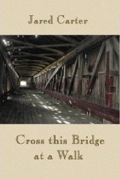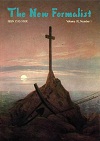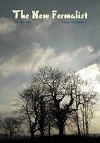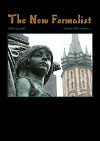Learning to Be an Edgy Poet
I want to learn from journal editors
The art of writing verse that opens doors
To publication in those highbrow pages
Where free-verse fever has become contagious.
One helpful editor in guidelines said she
Seeks poems that take risks, are bold, are . . . ED-GY,
t
n
u
That dare to f l a
a frac / tured
set
of
lines
And
T
R
O
M
P
on all accepted auld lang synes,
That sing off key, that act as arsonist,
And make of creativity a fist
To bust up order, form, and expectations,
Bamboozle old-guard readers, try their patience.
“The poet, to be published, innovates,”
She said. “You should not look to Frost or Yeats,
Or fret if no one gets your drift. Just please your
Self. Toss wild words. Achieve a grand mal seizure.”
I listened well. I want to learn the shtick
Of swimming with the fognoscenti [sic],
Pretending I’m an enigmatic squid in
Creative clouds of ink, securely hidden.
I’m eager now to find my unique voice.
I’ll first warm up, and then I’ll make a choice:
Do re mi fa sol la ti do . . . I say!
I think I’m ready. Where’s my pen? Allez!
First published in Words-Myth, 2008
Pathology Lab
The newly bared contents of this man’s brain:
The foul effluvia, the brilliant hues,
The tiny pots and tubes that slowly lose
Their useless liquid to the suction drain.
The skull’s grey bone beneath the flap of skin
Is widely notched by humming circle saw,
Revealing to the practiced eye the flaw
That killed in spite of every medicine.
Is cancer all pathologists could find?
Shakespeare’s plays he knew, and Helen’s face,
Beethoven, prayers, the evening sun. Could these
Afflict the man but leave no scar behind?
I hate that thing that cannot save a trace
Of art or love but hoards its own disease.
First published in Fifth Wednesday, 2008
The Relic in the Weeds
A curious whim brought me back home to find
Pa’s double-bottom plow. Its blades gleamed bright
In summers past, harsh-burnished by the grind
Of turning sod from dawn until last light.
Behind the barn, this relic hides in weeds,
No longer bright, nor hitched to Belgians now,
Fully retired—no commerce left with seeds.
The same with Pa: he’s resting like his plow.
They struggled breaking ground that gave them life
Till Pa himself became a bright plowshare,
Knife-sharp, deep-honed with sun and rub and strife,
Devoutly plowing on, as if in prayer.
“Don’t look back,” Jesus to the plowman said.
Pa set his mind on furrows straight ahead.
First published in Utmost Christian Writers, 2008
Paths
My walking round this farm makes paths in weeds.
Observers might conclude I’ve been confined
Along each path, to follow where it leads.
Yes, naturally, when walking, I’m inclined
To follow safely where I’ve gone before.
I could, if needed, walk those paths bat-blind.
One morning strolling toward the barn to chore,
I had a troubling thought. Did mind, like feet,
Prefer a lock-step down a corridor?
Later, I chewed on this while shocking wheat,
And wondered if a new thought ever came
To me—but who could think in all that heat?
Come cooler weather, it will be my aim
To ponder newness: why do people throw
Away the old, however good, in shame
For entertaining thoughts hatched long ago.
I call to mind the times when I’ve been told
Not to be satisfied with comme il faut.
I think I’ll ask myself if I’ve been sold
A bill of goods about the new and old?
First published in Word Catalyst Magazine, 2008
My Friend’s Advice
You say my poems are too commonplace.
Forget old farms, you say, and turn to face
Reality—today’s problems and needs.
The now, you say, is what I should embrace.
Find cause, you say, and follow where it leads,
Call out for action to correct misdeeds,
And deconstruct society’s decay:
This is the way a budding poet succeeds.
Don’t mess with horses, cows, and pigs, you say,
Get with modernity, and, by the way,
Abandon meter, lose that old quaint rhyme—
For God’s sake, man, you’re nothing but cliché . . .
I hear you, friend, appreciate your dime’s
Worth, and I’ll think on it when I get time.
Still Pursuing Truth
The lodestar, faint, elusive in the night,
Disappearing in the glare of day,
Puts me in mind of Truth, who does not stay.
She whispers; when I turn, she’s not in sight.
Much like shy nymph or wary woodland sprite,
Truth, lovely in revealing disarray,
Is wary of her suitor, slips away.
When boldest, still she flutters, poised for flight.
I once had hopes that I could seize her heart
By claiming to be through with whores. I’d add
That I am studying theology,
That I will burn my Nietzsche and my Sartre.
Alas, she sees right through this faithless cad
Who lies—still lies—with Relativity.
First published in Word Catalyst Magazine, 2008




Mr. Thackrey, I really liked your six poems. I felt some identity with the work and appreciated the effort you took to get some meter and rhyme into the verses. Some of the newer poetry without such discipline is often cute, even humerous, and occasionally has an edifying message, but will it still be around in 100 years? Is the answer that technology has doomed all poetry?